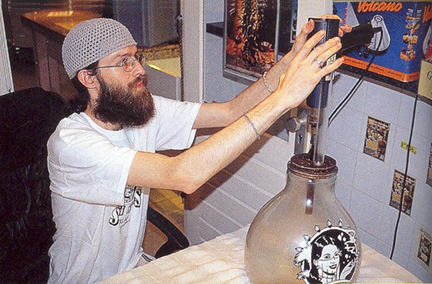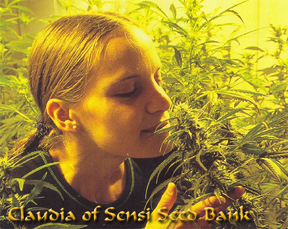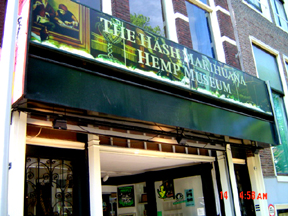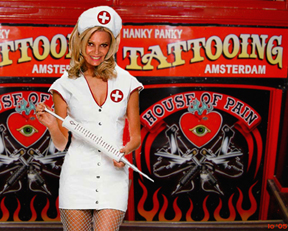No Fear & Loathing in Amsterdam

No Fear & Loathing in Amsterdam
The Changing Face of Europe’s Adult Playground
Iona Miller Interviews Expat, Joseph Aaron on the Amsterdam Scene, 8/2008
The Dutch coffeeshop scene is under severe political attack like never before. Incessant pressure from other countries—the US, France and Sweden are the top three culprits—and a rising conservative tide in the Dutch legislative body have left the shops more vulnerable than at almost any time in their history.
The coffeeshop movement dates back to the early 1970s, but the past seven years have brought several major changes in the rules which regulate the cannabis trade. First the shops were forced to choose between serving alcohol or cannabis products. January 1, 2007 it became a thing of the past.
Then the government mandated that there could be no advertising of the availability of cannabis products at any establishment. Even the ever-present cannabis menus at the shops must now be displayed face down until the customer requests to examine them or asks to see the buds and blocks of hash on hand. Now there is an actual smoking ban in the shops themselves, ostensibly to protect the workers from second-hand smoke.
So be aware that decriminalized public smoking is a privilege to be both respected and enjoyed while you're in Amsterdam. It's not a big thing to the Dutch citizenry but an acceptable recreational activity best practiced in private or in designated public areas like the coffeeshops. Your stay will be most rewarding if you maintain a sense of decorum and respect the local customs wherever you go. (High Times, 2008)
REFERENCES
Hager, Steven, GUIDE TO AMSTERDAM, High Times, Thu, Sep 23, 2004
Stinson, Jeffrey, USA TODAY, AMSTERDAM http://www.usatoday.com/news/world/2008-06-27-amsterdam-marijuana_N.htm
Dec 1, 2008 Dutch Mushroom ban goes into effect
It is official now - the Dutch ban the possession and distribution of
most mushrooms which naturally contain psilocin and psilocybin. Not all such mushrooms, because the law is
targeted towards a long list of (mostly) Panaeolus + Psilocybe species.
But some newly discovered species are not on that list.
Amanita muscaria becomes illegal too. Most likely
the Netherlands are the first country in the world where this is so.
Another strange formulation is the "naturally containing" part. To my
knowledge Panaeolus and Psilocybe species which are capable of
producing psilocin and/or psilocybin stop doing that when they grow on
substrates which naturally contain lots of phosphates (think about soil
rich in bird droppings for instance). The reason for that is that
psilocybin is a phosphate. And when there is a lot of phosphate in the
soil the mycelia produce enzymes which break those down, including their
own psilocybin.
So at first sight the new law is bad for smartshops and tourists but not
necessarily lethal for mycophiles who grow their own.
The prosecution guidelines for Psilocybe mushroom
production/possession/distribution published Dec. 1. According to the
Amsterdam TV station AT5 there is a treshold amount under which the
police will not take action. The threshold is half a gram for dried
mushrooms and five grams for fresh ones.
This means that you can still grow mushrooms for spore production, even
if the mushrooms do contain psilocybin. Five grams may not be much but
it is enough to stay on the safe side of the law.
And of course... sclerotia are not mushrooms. The Dutch law only outlaws
the fruitbodies and their cultivation!
> Dutch plan to weed out criminals
> Plans for giant cannabis farm to cut out 'back-door' supply to coffee shops
>
> The Dutch city of Eindhoven has caused a stir with a plan to set up a cannabis plantation to supply marijuana to its coffee shops. The move was announced at a "weed summit", when dozens of Dutch mayors urged the government to back the pilot project in an effort to clamp down on the criminals who supply the drug.
>
> The Netherlands, famed for having one of Europe's most tolerant policies on soft drugs, allows for the possession of less than 5g of marijuana and its sale in coffee shops, but bans the cultivation and supply of the drug to these shops. The majority of Dutch mayors say this legal "back door" has spawned an illicit industry worth €2bn (£1.7bn) a year.
>
> "It's time that we experimented with a system of regulated plantations so we can have strict guidelines and controls on the quality and price," Rob de Gijzel, the Mayor of Eindhoven, told the Dutch newspaper Volkskrant. "Authorities must get a grip on the supply of drugs to coffee shops."
>
> There are also concerns about the increasing strength of unregulated cannabis, with the content of tetrahydrocannabinol, the active chemical ingredient, doubling in recent years.
>
> The weed summit was called to thrash out a revamp of drugs policy after the provincial cities Roosendaal and Bergen op Zoom announced plans to shut all their coffee shops in the next two years to combat drugs tourism and criminal activity. They complain that the 1.3 million French and Belgians who come every year for a puff of weed or dash of hash are often badly behaved. Worse still, they are targeted by "drugs runners" who lure them away from legal outlets to back-door suppliers that offer harder, illegal drugs.
>
> Han Polman, the Mayor of Bergen op Zoom, said: "We are in favour of the Eindhoven experiment but we don't see it happening quickly. That's why we are going ahead with our shutdown."
>
> The Justice Minister Ernst Hirsch Ballin, of the conservative Christian Democratic Appeal party, has applauded these "courageous" efforts to wipe out coffee shops.
>
> The capital, Amsterdam, was in shock over the weekend after news that one in five of its coffee shops would be forced to close under a new law. The city council said 43 of 228 sites must close by the end of 2011 because they are within 250m of a school. This includes the famous Bulldog coffee shop, a tourist magnet housed in a former police headquarters on the Leidseplein. Three Canadian visitors were reeling from the news. One said: "We come here twice a year, we fly thousands of miles, spend probably €4,000 while we are here. It's the place to be!"
>
> The headmistress of a nearby school, Margriet Bosman, was equally unimpressed by the new measure: "This is just for show. Children will get their drugs if they want to anyway, and closing the shops, which are quite regulated, is not a very good solution."
>
> Amsterdam's mayor, Job Cohen, is also in favour of permitting the sale of soft drugs. "There should be a system... in which it is clear where soft drugs come from," he said. Many Dutch also want the tolerant approach to remain in place, with a newspaper poll this week showing 80 per cent of Dutch opposing coffee shop closures.
>
> Experts agree that a ban is not the answer. "A ban is even more dangerous than the grass itself because consumers will turn to illegal circuits and criminality will explode," said Tim Boekhout, a criminologist.
>
> The plan for a cannabis plantation will now go before the Dutch cabinet.
>
> Dutch drugs: in numbers
>
> £1.7bn The estimated value of the illicit cannabis industry in the Netherlands.
>
> 5 grams The maximum amount of cannabis an individual can have in his or her possession in Holland.
>
> 43 The number of coffee shops in Amsterdam that must close within the next three years.
>
http://www.minvws.nl/includes/dl/openbestand.asp?File=/images/vgp-2844534-532-bij-brief-ek-en-tk-b-_tcm19-165976.pdf
Publication of the government which declares that possession of 0.5 gram
dried or 5 grams fresh mushrooms will not be prosecuted (it is in the
last sentence of the publication):
http://www.om.nl/actueel/nieuws-_en/@149236/paddoverbod_van/?vakjargoninline=true
Definition problems:
The new law text declares a list of "paddo's" illegal. Paddo's are
defined as "mushrooms which naturally contain psilocin or psilocybin"
...but what are mushrooms? There is no definition of a mushroom in the
law. This is important for smartshops which offer sclerotia
("Philosopher stones") of Psilocybe mexicana or Psilocybe tampanensis,
or ready-to-fruit "grow kits" (trays of colonized grains with a casing
layer which usually produce Psilocbe cubensis mushrooms in about two
weeks after purchase).
Fortunately there does exist some juresprudence to clear this up. Back
in 1997 the Dutch High Court defined mushrooms to be "the fruiting
bodies of fungi which are micro-organisms and therefore a "substance" as
defined in article 1 of the Dutch Opium Law":
Paddestoelen zijn vruchtlichamen van schimmels, die als micro-organismen
worden aangemerkt en zijn derhalve een substantie in de zin van art. 1
Opiumwet.
link:
http://www.hetccv.nl/dossiers/Bestuurlijk_handhaven/Lokaal_drugsbeleid/Jurisprudentie/smartproducts/hallucinogene-paddestoelen/20001011_hofdenbosch.html
In this case the High Court declared the mushroom growers guilty because
their organization cultivated mushrooms for (among other things) the
production of dried mushrooms and psilocybin wafers (both illegal hard
drug preparations). So the fresh mushrooms were a starting material to
produce contraband.
In other words, if a given product is legal or not depends on its
purpose. In 1997 and until December 1st 2008 fresh mushrooms were not
illegal as long as their purpose was not to be dried or extracted. So,
currently the grow kits and sclerotia are IMHO not illegal as long as
they are not "paddo's" and/or their purpose is not to produce more than
0.5 grams of dried / 5 grams of fresh mushrooms.
The two biggest producers / distributors of sclerotia and growkits so
far were smart shop De Sjamaan and growers MushMush. De Sjamaan has a
text on its website about Psilocybe mexicana sclerotia in which they
describe this product as a "paddo" (quote: "Psilocybe mexicana zijn
zeer geschikte paddo's"- link:
http://www.sjamaan.com/nl/1813_Psilocybe_mexicana_truffels_(100_gram).html
And MushMush describes its growkit as "containing everything to produce
400 to 600 grams of fresh Psilocybe cubensis",
link:
http://www.mushmush.nl/?page=begin\kweekset
http://www.guardian.co.uk/world/feedarticle/8134055
Amsterdam to close many brothels, marijuana cafes
- AP foreign, Tuesday December 9 2008
*By TOBY STERLING*
Associated Press Writer= AMSTERDAM, Netherlands (AP) ??" Amsterdam unveiled
plans Saturday to close up to half of the famed brothels and marijuana cafes
in its ancient city center as part of a major cleanup operation.
The city says it wants to drive organized crime out of the district, and is
targeting businesses that "generate criminality," including prostitution,
gambling parlors, "smart shops" that sell herbal treatments, head shops and
"coffee shops" where marijuana is sold openly.
"I think that the new reality will be more in line with our image as a
tolerant and crazy place, rather than a free zone for criminals" said
alderman Lodewijk Asscher, one of the main proponents of the plan.
The city said it would also reduce the number of business it sees as related
to the "decay" of the center, including peep shows, sex theaters, sex shops,
mini supermarkets, massage parlors and souvenir shops.
The city said there were too many of these and it believes some are used for
money-laundering by drug dealers and the human traffickers who supply many
of the city's prostitutes.
Asscher underlined that the city will remain true to its freewheeling
reputation.
"It'll be a place with 200 windows (for prostitutes) and 30 coffee shops,
which you can't find anywhere else in the world ??" very exciting, but also
with cultural attractions and you won't have to be embarrassed to say you
came," he said.
Under the plan announced Saturday, Amsterdam will spend ???30-???40 million
($38-$51 million) to bring hotels, restaurants, art galleries and boutiques
to the center. It will also build new underground parking areas for cars and
bikes and may use some of the vacated buildings to ease a housing shortage.
Amsterdam already had plans to close many brothels and said last month it
might close some coffee shops throughout the city, but the plans announced
Saturday go much further.
Asscher said the city would use various techniques to reshape the area,
including rezoning, buying out some businesses and offering others
assistance in "upgrading" their stores. In the past, the city has shut a
number of brothels and sex clubs, relying primarily on a law that allows the
closure of businesses with bookkeeping irregularities.
He said the city will also offer help for prostitutes and coffee shop
employees who lose their jobs as a result of the plan.
Prostitution, which has spread into several areas of the center, will be
allowed only in two areas ??" notably De Wallen ("The Walls"), a web of
streets and alleys around the city's medieval retaining dam walls. The area
has been a center of prostitution since before the city's golden shipping
age in the 1600s.
Prostitution was legalized in the Netherlands in 2000, formalizing a
long-standing tolerance policy.
Marijuana is technically illegal in the Netherlands, but prosecutors won't
press charges for possession of small amounts and the coffee shops are able
to sell it openly.



